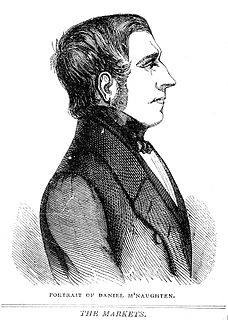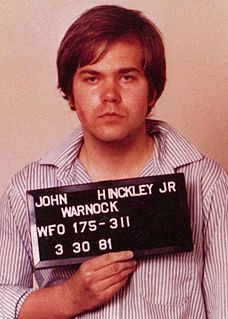By Reason of Insanity may refer to:
- By Reason of Insanity (TV series), a 2015 BBC documentary miniseries
- By Reason of Insanity (film), a 1982 Canadian short courtroom drama television film
- A novel
By Reason of Insanity may refer to:
The insanity defense, also known as the mental disorder defense, is an affirmative defense by excuse in a criminal case, arguing that the defendant is not responsible for their actions due to an episodic psychiatric disease at the time of the criminal act. This is contrasted with an excuse of provocation, in which the defendant is responsible, but the responsibility is lessened due to a temporary mental state. It is also contrasted with a finding that a defendant cannot stand trial in a criminal case because a mental disease prevents them from effectively assisting counsel, from a civil finding in trusts and estates where a will is nullified because it was made when a mental disorder prevented a testator from recognizing the natural objects of their bounty, and from involuntary civil commitment to a mental institution, when anyone is found to be gravely disabled or to be a danger to themself or to others.

The M'Naghten rule is any variant of the 1840s jury instruction in a criminal case when there is a defence of insanity:
that every man is to be presumed to be sane, and ... that to establish a defence on the ground of insanity, it must be clearly proved that, at the time of the committing of the act, the party accused was labouring under such a defect of reason, from disease of the mind, as not to know the nature and quality of the act he was doing; or if he did know it, that he did not know he was doing what was wrong.
Madness or The Madness may refer to:
Sanity refers to the soundness, rationality, and health of the human mind, as opposed to insanity. A person is sane if they are rational. In modern society, the term has become exclusively synonymous with compos mentis, in contrast with non compos mentis, or insanity, meaning troubled conscience. A sane mind is nowadays considered healthy both from its analytical - once called rational - and emotional aspects. According to the writer G. K. Chesterton, sanity involves wholeness, whereas insanity implies narrowness and brokenness.

John Warnock Hinckley Jr. is an American man who attempted to assassinate U.S. President Ronald Reagan in Washington, D.C. on March 30, 1981, two months after Reagan's first inauguration. Using a .22 caliber revolver, Hinckley wounded Reagan, police officer Thomas Delahanty, and Secret Service agent Tim McCarthy. He critically wounded White House Press Secretary James Brady, who was left permanently disabled in the shooting.
The Matrix defense is a legal defense based on the premise of the film franchise The Matrix, in which reality is a computer generation and the real world is different from what reality is popularly perceived to be.

The X-Ecutioners are a group of American hip hop DJs/turntablists from New York City, New York. The group formed in 1989 and currently consists of three DJs, including Total Eclipse, DJ Boogie Blind, DJ Precision. Original members of the group included Mista Sinista, Rob Swift, and Roc Raida.

"Virtual Insanity" is a song by British funk band Jamiroquai. It was released as the second single from their third studio album, Travelling Without Moving (1996), on 19 August 1996. It interpolates parts of Jocelyn Brown's post-disco hit "Somebody Else's Guy" (1984). The song's award-winning music video was released in September 1996. "Virtual Insanity" was a number-one hit in Iceland and reached number three on the UK Singles Chart. As well as becoming a top-ten hit in Finland, Ireland, and Italy, the song also climbed to number 38 on the Billboard Modern Rock Tracks chart upon the single's release in the United States in 1997. The song also earned the band a Grammy Award for Best Pop Vocal Performance by a Duo or Group.
Toys in the Attic is a euphemism for insanity; it may also refer to:
NGRI may refer to:
Foucha v. Louisiana, 504 U.S. 71 (1992), was a U.S. Supreme Court case in which the court addressed the criteria for the continued commitment of an individual who had been found not guilty by reason of insanity. The individual remained involuntarily confined on the justification that he was potentially dangerous even though he no longer suffered from the mental illness that served as a basis for his original commitment.
Anthony Page is a British stage and film director.
This is a list of Canadian television related events from 1982.
The Crazies may refer to:
Insanity is a spectrum of behaviors characterized by certain abnormal mental or behavioral patterns.
An old maid is a spinster.
Insane behavior, or insanity, is characterized by abnormal mental or behavioral patterns.

The Psychopath Test: A Journey Through the Madness Industry is a 2011 book written by British author Jon Ronson in which he explores the concept of psychopathy, along with the broader mental health "industry" including mental health professionals and the mass media. It spent the whole of 2012 on United Kingdom bestseller lists and ten weeks on The New York Times Best Seller list.
By Reason of Insanity is a two-part 2015 BBC documentary miniseries by Louis Theroux. It focuses on the lives of mental patients at two of Ohio's state psychiatric hospitals Twin Valley Behavioral Healthcare and Summit Behavioral Healthcare who have been sent there after committing crimes but having been acquitted by reason of insanity.
By Reason of Insanity is a 1982 Canadian short courtroom drama television film written by David McLaren and directed by Donald Shebib which examines the use of insanity pleas in murder cases. The film was produced by Alan Burke and made for the anthology series For the Record.